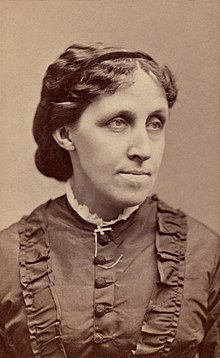
Back Louisa May Alcott Afrikaans Louisa May Alcott AN لويزا ماي ألكوت Arabic لويزا ماى الكوت ARZ Louisa May Alcott Aymara Luiza Mey Alkott Azerbaijani لوییزا می الکات AZB Louisa May Alcott BCL Луіза Мэй Олкат Byelorussian Луиза Мей Олкът Bulgarian
Louisa May Alcott | |
|---|---|
 Alcott, c. 1870 | |
| Born | November 29, 1832 Germantown, Pennsylvania U.S. (present-day Philadelphia) |
| Died | March 6, 1888 (aged 55) Boston, Massachusetts, U.S. |
| Resting place | Sleepy Hollow Cemetery, Concord, Massachusetts, U.S. |
| Pen name | A. M. Barnard |
| Occupation | Novelist |
| Period | American Civil War |
| Genre |
|
| Subject | Young adult fiction |
| Signature | |
Louisa May Alcott (/ˈɔːlkət, -kɒt/; November 29, 1832 – March 6, 1888) was an American novelist, short story writer, and poet best known for writing the novel Little Women (1868) and its sequels Good Wives (1869), Little Men (1871) and Jo's Boys (1886).[1] Raised in New England by her transcendentalist parents, Abigail May and Amos Bronson Alcott, she grew up among many well-known intellectuals of the day, including Margaret Fuller,[2] Ralph Waldo Emerson, Nathaniel Hawthorne, Henry David Thoreau, and Henry Wadsworth Longfellow.[3]
Alcott's family suffered from financial difficulties, and while she worked to help support the family from an early age, she also sought an outlet in writing. She began to receive critical success for her writing in the 1860s. Early in her career, she sometimes used pen names such as A. M. Barnard, under which she wrote lurid short stories and sensation novels for adults that focused on passion and revenge.[4]
Published in 1868, Little Women is set in the Alcott family home, Orchard House, in Concord, Massachusetts, and is loosely based on Alcott's childhood experiences with her three sisters, Abigail May Alcott Nieriker, Elizabeth Sewall Alcott, and Anna Alcott Pratt. The novel was well-received at the time and is still popular today among both children and adults. It has been adapted for stage plays, films, and television many times.
Alcott was an abolitionist and a feminist and remained unmarried throughout her life. She also spent her life active in reform movements such as temperance and women's suffrage.[5] She died from a stroke in Boston on March 6, 1888, just two days after her father's death.
- ^ Cite error: The named reference
Cullen-uglywas invoked but never defined (see the help page). - ^ "Humanity, Said Edgar Allan Poe, Is Divided Into Men, Women, And Margaret Fuller". American Heritage. Archived from the original on December 28, 2022. Retrieved December 28, 2022.
- ^ "Louisa May Alcott: The Woman Behind 'Little Women'". American Masters. PBS. December 2009. Archived from the original on August 3, 2020. Retrieved May 2, 2020.
- ^ "Louisa May Alcott". University of Alabama. 2005. Archived from the original on December 5, 2020. Retrieved September 3, 2020.
- ^ Norwich, John Julius (1990). Oxford Illustrated Encyclopedia Of The Arts. USA: Oxford University Press. p. 11. ISBN 978-0-19-869137-2.
© MMXXIII Rich X Search. We shall prevail. All rights reserved. Rich X Search